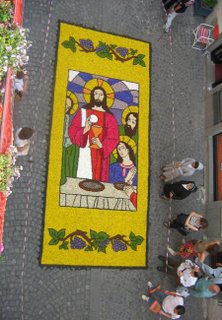Faith Seeking Understanding for June 25, 2006
Summer is finally upon us, along with warm weather to enjoy and road construction to avoid, especially on those long family drives. Summertime, especially with its lazy days and pleasant evenings can be a great opportunity to grow in our spiritual lives and draw closer to God. Vacations provide the perfect change in environment and schedule to examine our spiritual life during the routine days. Sometimes, we have enough time to pray and meditate more; other times, we may have the urge to find a new spiritual book, or read the Scriptures in a new light; and on vacation, attending Mass at a different parish is always an opportunity to experience the wider Catholic world.
How can we make the most of these times that refresh us in body and soul? What are some concrete ways to grow closer to Christ this summer?
Just as our final festival reminded us to “take Jesus with us” on vacation, that truth is essential to growing in our spiritual lives this summer. Simply reminding ourselves that Christ accompanies us throughout every aspect of our life can be enough to prompt prayers of praise, thanksgiving, petition, and even contrition. When we look at a beautiful summer sunset, sing songs around the campfire, or enjoy a weekend at the cabin, these times of rest and relaxation are all gifts from God.
Family prayer can also take these changes in schedule into account: praying the rosary together on long drives, praying in petition and thanksgiving for safe travel, and prayers before and after meals (even in restaurants!) can bring God into our recreation.
St. Irenaeus (whom the Church celebrates this Wednesday, June 28th), is a Father of the Church who knew exactly what it meant to have Jesus as part of every moment of his life. He was born around
He is most famous for his work Adversus Hæreses (Against the Heresies), which clearly and forcefully presents the Catholic teaching against the Gnostics, who sought a secret gnosis, or “knowledge” to bring about salvation. Another work, lost for centuries, was discovered in the early 1900’s, entitled The Proof of the Apostolic Preaching. These early writings offer a glimpse at the continuity of the teaching of the Catholic Church throughout the centuries. Irenaeus, as a bishop, was faced with theological challenges and disagreements, but instead of bowing to pressure, he taught what he had received: “This, beloved, is the preaching of the truth, and this is the manner of our redemption, and this is the way of life, which the prophets proclaimed, and Christ established, and the apostles delivered, and the Church in all the world hands on to her children” (Proof of the Apostolic Preaching, 98).
We also celebrate the feast of Ss. Peter and Paul this week (June 29th) and the First Martyrs of the Church of Rome (June 30th). All of these saints bear witness to the importance of keeping Christ first in everything that we do, even to the very sacrifice of our lives for the Gospel.
May God bless you this summer as you travel (or stay at home!), and bring you closer to His Son’s Sacred Heart!
